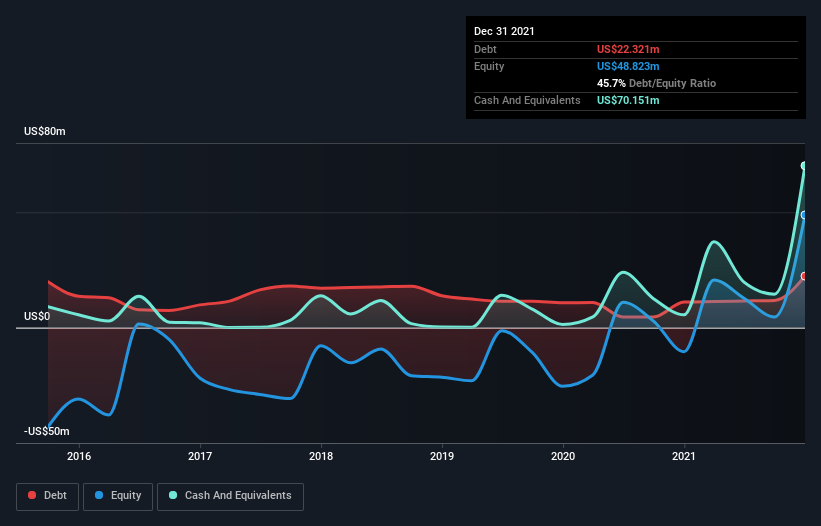
Some say volatility, rather than debt, is the best way to think about risk as an investor, but Warren Buffett famously said that 'Volatility is far from synonymous with risk.' So it might be obvious that you need to consider debt, when you think about how risky any given stock is, because too much debt can sink a company. We note that Outlook Therapeutics, Inc. (NASDAQ:OTLK) does have debt on its balance sheet. But the real question is whether this debt is making the company risky.
When Is Debt A Problem?
Generally speaking, debt only becomes a real problem when a company can't easily pay it off, either by raising capital or with its own cash flow. In the worst case scenario, a company can go bankrupt if it cannot pay its creditors. However, a more frequent (but still costly) occurrence is where a company must issue shares at bargain-basement prices, permanently diluting shareholders, just to shore up its balance sheet. Having said that, the most common situation is where a company manages its debt reasonably well - and to its own advantage. When we examine debt levels, we first consider both cash and debt levels, together.
See our latest analysis for Outlook Therapeutics
What Is Outlook Therapeutics's Debt?
You can click the graphic below for the historical numbers, but it shows that as of December 2021 Outlook Therapeutics had US$22.3m of debt, an increase on US$11.1m, over one year. But on the other hand it also has US$70.2m in cash, leading to a US$47.8m net cash position.

How Strong Is Outlook Therapeutics' Balance Sheet?
The latest balance sheet data shows that Outlook Therapeutics had liabilities of US$19.9m due within a year, and liabilities of US$9.91m falling due after that. On the other hand, it had cash of US$70.2m and US$100.0k worth of receivables due within a year. So it actually has US$40.4m more liquid assets than total liabilities.
This surplus suggests that Outlook Therapeutics has a conservative balance sheet, and could probably eliminate its debt without much difficulty. Simply put, the fact that Outlook Therapeutics has more cash than debt is arguably a good indication that it can manage its debt safely. The balance sheet is clearly the area to focus on when you are analysing debt. But it is future earnings, more than anything, that will determine Outlook Therapeutics's ability to maintain a healthy balance sheet going forward. So if you want to see what the professionals think, you might find this free report on analyst profit forecasts to be interesting.
Given its lack of meaningful operating revenue, Outlook Therapeutics shareholders no doubt hope it can fund itself until it has a profitable product.
So How Risky Is Outlook Therapeutics?
Statistically speaking companies that lose money are riskier than those that make money. And we do note that Outlook Therapeutics had an earnings before interest and tax (EBIT) loss, over the last year. Indeed, in that time it burnt through US$52m of cash and made a loss of US$53m. Given it only has net cash of US$47.8m, the company may need to raise more capital if it doesn't reach break-even soon. Overall, its balance sheet doesn't seem overly risky, at the moment, but we're always cautious until we see the positive free cash flow. There's no doubt that we learn most about debt from the balance sheet. However, not all investment risk resides within the balance sheet - far from it. We've identified 3 warning signs with Outlook Therapeutics (at least 1 which is significant) , and understanding them should be part of your investment process.
When all is said and done, sometimes its easier to focus on companies that don't even need debt. Readers can access a list of growth stocks with zero net debt 100% free, right now.
New: AI Stock Screener & Alerts
Our new AI Stock Screener scans the market every day to uncover opportunities.
• Dividend Powerhouses (3%+ Yield)
• Undervalued Small Caps with Insider Buying
• High growth Tech and AI Companies
Or build your own from over 50 metrics.
Have feedback on this article? Concerned about the content? Get in touch with us directly. Alternatively, email editorial-team (at) simplywallst.com.
This article by Simply Wall St is general in nature. We provide commentary based on historical data and analyst forecasts only using an unbiased methodology and our articles are not intended to be financial advice. It does not constitute a recommendation to buy or sell any stock, and does not take account of your objectives, or your financial situation. We aim to bring you long-term focused analysis driven by fundamental data. Note that our analysis may not factor in the latest price-sensitive company announcements or qualitative material. Simply Wall St has no position in any stocks mentioned.
About NasdaqCM:OTLK
Outlook Therapeutics
Operates as a clinical-stage biopharmaceutical company, focuses on developing and commercializing monoclonal antibodies for various ophthalmic indications.
Medium-low with high growth potential.


